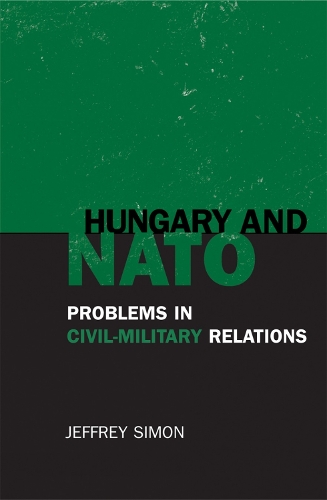
Hungary and NATO: Problems in Civil-Military Relations
(Paperback)
Publishing Details
Hungary and NATO: Problems in Civil-Military Relations
By (Author) Jeffrey Simon
Bloomsbury Publishing PLC
Rowman & Littlefield Publishers
16th September 2003
United States
Classifications
Tertiary Education
Non Fiction
Warfare and defence
355.0335439
Physical Properties
Paperback
144
Width 150mm, Height 229mm, Spine 11mm
218g
Description
Since the revolutions of 1989-1990, most Central and Eastern European states have been striving to adhere to Euro-Atlantic institutions; and when NATO developed its own "criteria" for membership, democratic control of the military was considered an essential precondition. Based on firsthand participatory and observational insight, Hungary and NATO: Problems in Civil-Military Relations closely follows Hungary's early work to secure an invitation to join the Alliance in July 1997, preparations for accession in March 1999, and its first four years as a NATO ally. While charting the successes, shortcomings, and continuing challenges faced in its quest to become a full NATO member, Jeffrey Simon presents a comprehensive and original study of civil-military relations in Hungary and simultaneously provides a conceptual framework of civil-military relations that draws upon the lessons of post-communist transition in the entire Central and East European region.
Reviews
Jeffrey Simon knows the Hungarian armed forces better than most Hungarians. He is one of the few who can not only point out deficiencies, but also offer solutions to the huge problems of defense reform. Always open and outspoken, he tells the truththis hasn't made him popular with everybodybut his insight and thorough analysis have always served Hungary and the other former Warsaw Pact countries extremely well. I only wish they had made more use of his advice. -- Ambassador Istvn Gyarmati, former deputy state secretary for defense policy, Hungarian Ministry of Defense
Jeffrey Simon has done more to advance the cause of defense reform in Central Europe than anyone else. His knowledge of the issue, of the problems specific to each country, and of the personalities involved is second to none. He is respected everywhere for his rigorous and objective analysis, for his frankness and readiness to take on even the most intractable problems, and for his determination to ensure that nations, institutions, and individuals not only face up to the crucial, if painful, reform decisions, but persevere in implementing them. In this work on Hungary, the author demonstrates vividly why he has earned this reputationthis is now the authoritative book on this subject and sets the standard by which all other works will be judged. -- Christopher Donnelly, special adviser for Central and Eastern European Affairs
No author is better qualified, based on his detailed research and his experience, to tell the story of the emerging post-communist countries of Central and Eastern Europe than Jeff Simon. * Parameters *
Careful and informative. Simon provides a detailed chronology of defense reforms since communism's collapse. * Naval War College Review *
[This book] will stand as a reference point in future scholarship. [It is] carefully researched and well footnoted, citing all the right sources-in short, an excellent effort from Simon. * Slavic Review *
Inside or outside the U.S. government, Dr. Simon is the leading American specialist on European military issues, and his immense knowledge is reflected in Hungary and NATO: Problems in Civil-Military Relations. While the text is comprehensive, the reader is not lost in unnecessary details, and although it is interpretive, the reader is allowed to make up his or her mind. Above all, this study is important as NATOseeking to redefine its role once againmay soon be relying on military contributions by the Central and East Europeans, including the Hungarians. This is essential reading for those interested in the future of NATO. -- Charles Gati, Senior Research Professor of European and Eurasian Studies, Johns Hopkins University School of Advanced International Studies
Author Bio
Jeffrey Simon is senior fellow at the Institute for National Strategic Studies, National Defense University.
